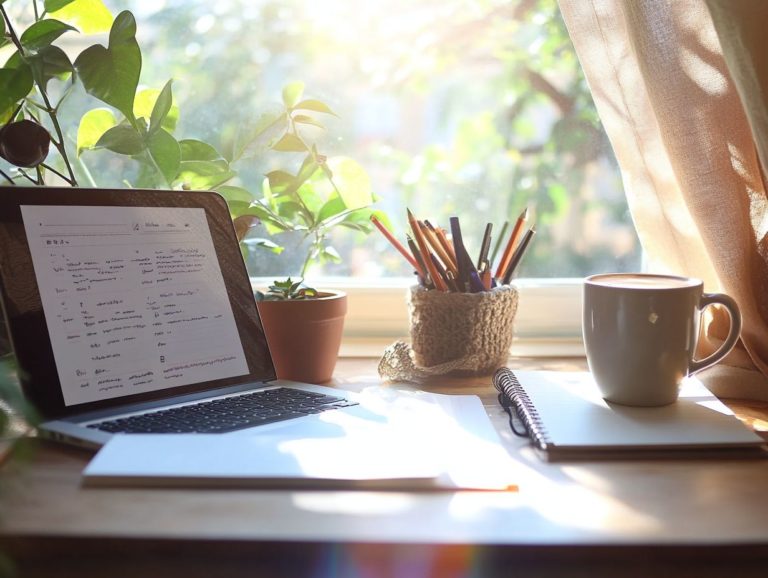Understanding the Benefits of Gratitude in Reducing Procrastination
Gratitude is not merely a pleasant emotion; it serves as a formidable tool in the battle against procrastination.
By practicing gratitude, you can enhance your mental well-being and significantly boost your productivity. Explore the intriguing link between gratitude and procrastination, and uncover practical strategies to weave this practice seamlessly into your daily routine.
Transforming your mindset and habits allows you to leverage the advantages of gratitude, radically changing how you tackle tasks and pursue your goals.
Contents
- Key Takeaways:
- The Link Between Gratitude and Procrastination
- Benefits of Practicing Gratitude
- How Gratitude Reduces Procrastination
- Ways to Cultivate Gratitude
- Frequently Asked Questions
- What exactly is gratitude, and how can it help you stop procrastinating?
- How can practicing gratitude help with reducing procrastination?
- What are some specific benefits of gratitude in reducing procrastination?
- Can gratitude help overcome negative thoughts that lead to procrastination?
- How can I add gratitude to my daily routine to fight procrastination?
- Is there scientific evidence that supports gratitude’s role in reducing procrastination?
Key Takeaways:

- Practicing gratitude can reduce procrastination by improving mental health and increasing productivity.
- Cultivating a grateful mindset can help change our approach to tasks.
- Simple tips, like keeping a gratitude journal, can help foster gratitude.
The Link Between Gratitude and Procrastination
The intricate connection between gratitude and procrastination suggests that practicing gratitude can elevate your emotional well-being while disrupting detrimental cycles of procrastination.
Research indicates that those who actively practice gratitude are more adept at managing stress, ultimately resulting in enhanced mental health and heightened motivation.
Embracing the transformative power of gratitude can liberate you from chronic procrastination and help cultivate healthier coping mechanisms that enrich your overall life satisfaction.
Exploring the Connection
Exploring the connection between gratitude and procrastination reveals the intricate mechanisms that link emotional flexibility and coping skills to your ability to manage negative emotions effectively.
When you practice gratitude, you enhance your emotional awareness and cultivate a resilient mindset that gives you the power to tackle life’s challenges. Individuals who regularly express gratitude tend to experience improved psychological well-being, playing a crucial role in overcoming bouts of procrastination and mental fatigue.
A study published by the NIH Office of Communications highlights how gratitude fosters adaptive responses to stress, making it easier for you to shift your focus away from anxiety-inducing tasks. By nurturing a sense of appreciation, you enhance your emotional agility, leading to better coping strategies that combat mental exhaustion and promote a healthier lifestyle.
Benefits of Practicing Gratitude
Practicing gratitude brings a wealth of health benefits that can significantly enhance your emotional well-being and cultivate positive feelings in your daily life. From boosting your mental health to strengthening supportive relationships, embracing gratitude can profoundly enrich your quality of life.
By regularly engaging in gratitude practices, you harness a powerful self-care strategy that contributes to a happier existence and greater overall life satisfaction.
Improved Mental Health

Improved mental health stands out as one of the most profound benefits of embracing gratitude. It effectively addresses emotional challenges and builds resilience against anxiety and depression.
This positive perspective holds particular significance for vulnerable groups, such as LGBTQ+ individuals, who often encounter unique stressors that elevate their risk for mental health issues. Imagine reducing your risk of depression by up to 30% just by practicing gratitude!
Experts emphasize that gratitude not only amplifies positive emotions but also fosters a sense of belonging and community. This sense of connection can be invaluable for those navigating the complexities of social stigma and discrimination.
Increase in Productivity
An increase in productivity is a remarkable benefit you can experience by incorporating gratitude into your daily routine. It elevates your self-esteem and fuels your motivation.
Expressing gratitude boosts engagement at work. Studies show that grateful individuals report higher job satisfaction. For example, research from the University of California shows that professionals who embrace gratitude are not only more productive but also more collaborative and resilient when facing challenges.
By nurturing a culture of appreciation within your organization, you can witness not just improved performance metrics but also a more harmonious workplace atmosphere. This shift in perspective transforms mundane tasks into meaningful contributions, invigorating both team dynamics and individual creativity.
How Gratitude Reduces Procrastination
Gratitude diminishes procrastination by cultivating a mindset that highlights positive emotions and motivation. This shift is crucial for effective stress management and taking care of your feelings.
Changing Mindset and Habits
Changing your mindset and habits through gratitude involves cultivating deeper self-awareness and fostering a positive emotional response to the daily challenges you encounter.
By consciously reflecting on the aspects of life that bring you joy, you can shift your focus from negativity to appreciation. This transformation allows you to develop healthier coping mechanisms when faced with stressors, giving you the power to respond thoughtfully rather than react impulsively.
You can cultivate this gratitude-focused mindset through practices like journaling, where you regularly jot down the things you are thankful for, or through mindfulness exercises that encourage you to live in the moment.
This practice enhances your emotional resilience and nurtures your overall well-being, helping you build improved relationships and a more optimistic outlook on life.
Ways to Cultivate Gratitude

Cultivating gratitude is within your reach through a variety of meaningful practices. Consider keeping a gratitude journal or writing gratitude letters; these powerful tools not only enhance your self-care routine but also provide invaluable emotional support.
Practical Tips and Exercises
Practical tips and exercises for cultivating gratitude include starting a gratitude journal, practicing mindfulness, and seamlessly weaving gratitude into your daily routine to elevate your emotional awareness.
One particularly effective method is engaging in daily gratitude reflections. Start today and feel the difference almost immediately! Spend a few moments each day jotting down three things you’re thankful for. Research indicates that this simple act can lead to notable improvements in your overall happiness and life satisfaction.
Another powerful exercise is sharing your gratitude with close friends or family. This not only strengthens your relationships but also fosters a supportive emotional environment. Imagine initiating a ‘gratitude circle’ over coffee this sparks exciting conversations that strengthen your bonds!
Studies show that expressing gratitude can enhance your mental health by reducing symptoms of depression, further reinforcing its positive impacts on your well-being.
Frequently Asked Questions
What exactly is gratitude, and how can it help you stop procrastinating?
Gratitude is the act of appreciating and being thankful for what we have. It can help reduce procrastination by increasing positive emotions and motivation, making tasks feel more enjoyable and meaningful.
How can practicing gratitude help with reducing procrastination?

By focusing on the positive aspects of our lives and recognizing the things we are grateful for, we can shift our mindset to a more optimistic and motivated one, making it easier to tackle tasks and avoid procrastination.
What are some specific benefits of gratitude in reducing procrastination?
Gratitude boosts self-control and lowers stress. This can help reduce procrastination and enhance productivity.
Can gratitude help overcome negative thoughts that lead to procrastination?
Yes! Gratitude shifts our focus from negativity to positivity. It helps us appreciate our strengths, boosting our confidence to tackle tasks.
How can I add gratitude to my daily routine to fight procrastination?
Start a gratitude journal by writing down a few things you appreciate each day. Also, express gratitude to others through thank-you notes or simple gestures.
Is there scientific evidence that supports gratitude’s role in reducing procrastination?
Absolutely! Research shows a clear connection between gratitude and less procrastination. It s linked to better self-control, improved motivation, and less avoidance of tasks.






